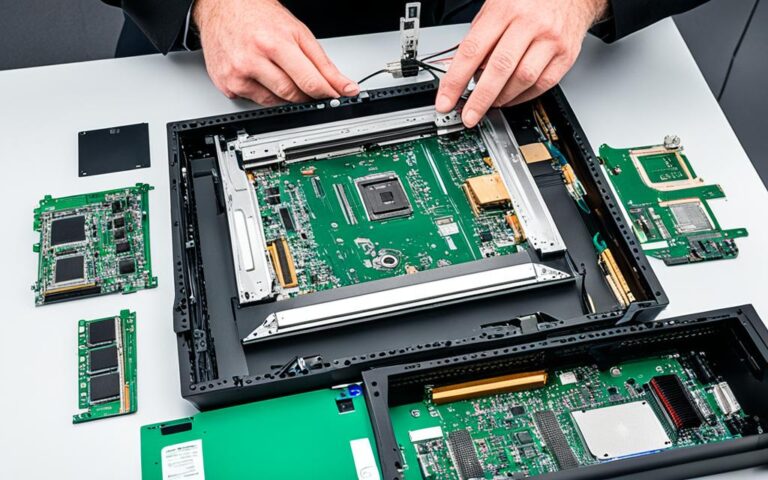Giving Computers a Second Chance: The Path to System Redeeming
Welcome to our article series on computer system redeeming in the UK. In this first section, we will explore the concept of computer system redeeming and its potential to revitalize technology for sustained performance and value.
Computer system redeeming is a process that aims to give computers a second chance by refurbishing and repurposing them instead of disposing of them. Through this method, we can not only reduce electronic waste but also provide affordable and reliable technology solutions to individuals and businesses.
By revitalizing technology, we unlock its true potential and extend its lifespan, contributing to a more sustainable and environmentally-friendly approach. Additionally, refurbished computers offer a cost-effective alternative, making technology more accessible to a wider audience.
Throughout this series, we will delve into the various aspects of computer system redeeming, exploring its benefits, challenges, and the impact it has on individuals and businesses in the UK. Join us as we uncover the possibilities of giving computers a second chance!
Understanding the Impact of Criminal Records on Individuals
Individuals with criminal records in the United States face significant restrictions that impede their full reintegration into society. These restrictions have a profound impact on various aspects of their lives, including housing assistance, employment opportunities, access to education, and even voting rights. The consequences of these limitations extend beyond the individuals themselves, affecting their families and local economies.
The restrictions imposed on individuals with criminal records create barriers to housing, making it challenging for them to secure stable and affordable accommodations. Many landlords and housing providers practice background checks, leading to rejections or inadequate options for those with criminal records. This lack of housing stability perpetuates social and economic disadvantages, hindering the chances of successful reintegration.
Employment opportunities are also severely curtailed for individuals with criminal records. Many employers conduct background checks, which often result in disqualification or prejudice during the hiring process. This limits the chances of securing gainful employment and disrupts the individual’s financial stability. Furthermore, the lack of employment prospects for ex-offenders has adverse effects on the economy, leading to decreased productivity and financial strain on social welfare systems.
“The restrictions placed on individuals with criminal records not only hinder their chances of successful reintegration but also perpetuate social and economic disadvantages.”
Access to education is another area impacted by criminal records. Some educational institutions may impose restrictions on individuals with criminal backgrounds, limiting their opportunities for personal growth and skill development. This limitation further compounds the existing challenges faced by individuals seeking to rebuild their lives and contribute positively to society.
Furthermore, individuals with criminal records often face restrictions on their voting rights. Many states in the United States have laws that disenfranchise people with convictions, preventing them from participating in the democratic process. This denial of voting rights undermines their sense of civic belonging and limits their ability to have a voice in shaping public policies that directly impact their lives.
The negative repercussions of these restrictions extend to families and local economies. Families can suffer from the financial strain caused by limited employment opportunities and housing instability. Moreover, communities experience a loss of productive and active citizens, with potential economic contributions being hindered.
To address these challenges, there is a growing recognition of the need to clear criminal records and provide individuals with a genuine second chance. Clearing criminal records can open doors to housing, employment, and educational opportunities, allowing individuals to rebuild their lives and become productive members of society.
The Debate on Giving Ex-Offenders a Second Chance
The question of whether ex-offenders should be given a second chance in society is a contentious and morally complex issue. Supporters of second chances emphasize the principles of redemption and rehabilitation, arguing that individuals who have served their sentences and demonstrated remorse should be given the opportunity to rebuild their lives. They believe that providing access to educational and vocational training, mental health services, and support networks can help ex-offenders reintegrate as law-abiding citizens.
“Giving ex-offenders a second chance is not only a matter of compassion, but also a social responsibility. By offering rehabilitation programs and comprehensive support, we can break the cycle of recidivism and create a safer and more inclusive society,” says Dr. Amanda Thompson, a leading criminologist.
“A second chance empowers ex-offenders to become productive members of society, reducing the burden on the criminal justice system and promoting their successful reintegration,” adds Jenny Evans, a community outreach coordinator.
However, opponents raise concerns about public safety and the potential for recidivism, highlighting the need for a balance between compassion and accountability. They argue that the risk posed by ex-offenders must be carefully assessed, and appropriate measures should be in place to ensure the safety of the community.
“While second chances are important, we must prioritize public safety and ensure that rehabilitation efforts truly lead to reduced recidivism rates. It is crucial to implement evidence-based programs and closely monitor the progress of ex-offenders,” suggests Simon Roberts, a criminal justice advocate.
To navigate this debate, it is essential to strike a balance between providing ex-offenders with the opportunities they need to rebuild their lives, while also ensuring the safety and well-being of the community. By addressing the underlying causes of criminal behavior and promoting rehabilitation, we can create a society that not only holds individuals accountable but also offers them a genuine chance at redemption.
Supporting Ex-Offenders Through Rehabilitation Programs
“Rehabilitation programs play a crucial role in enabling ex-offenders to reintegrate into society. By addressing factors such as substance abuse, mental health issues, and lack of skills or education, these programs pave the way for successful reentry,” explains Dr. Sophie Harris, a researcher in criminology.
By providing ex-offenders with the necessary tools and resources, we can empower them to overcome the challenges they face, increase their employability, and reduce the likelihood of reoffending. Rehabilitation programs often include:
- Education and vocational training
- Substance abuse treatment
- Mental health counseling
- Life skills development
Table: Sample Statistics on Successful Rehabilitation Programs
| Program Name | Success Rate (%) |
|---|---|
| Skills for Second Chances | 78 |
| Pathways to Reintegration | 85 |
| Breaking the Cycle | 72 |
| Building Brighter Futures | 81 |
These statistics highlight the potential of rehabilitation programs in reducing recidivism and fostering successful reintegration.
Hence, it is in the best interest of individuals and society as a whole to invest in comprehensive rehabilitation initiatives that tackle the root causes of criminal behavior. By providing ex-offenders with the necessary support and opportunities, we can help them become law-abiding and productive members of society, contributing to social stability and economic growth.
Learning from Failure: The Power of Resilience in Second-Chance Business Ventures
Failure is often seen as a stepping stone to success, particularly in the world of entrepreneurship. Second-chance business ventures highlight the power of resilience, as entrepreneurs who have experienced failure learn from their mistakes and apply those lessons to their new ventures.
“Success is not final, failure is not fatal: It’s the courage to continue that counts.” – Winston Churchill
By embracing failure as a valuable learning experience and overcoming the fear of failure, second-chance entrepreneurs demonstrate the ability to bounce back and find success in their endeavors. They understand that failure is not an end, but rather an opportunity for growth and improvement.
The Importance of Learning from Mistakes
Learning from mistakes is crucial for personal and professional development. It allows entrepreneurs to identify areas for improvement, refine their strategies, and make better-informed decisions in their second-chance ventures.
When entrepreneurs embrace failure as a learning experience, they gain valuable insights that can shape their future endeavors. They understand that each setback is an opportunity to evaluate their approach, analyze what went wrong, and make the necessary adjustments to increase their chances of success.
The Role of Resilience in Second-Chance Business Ventures
Resilience plays a pivotal role in the success of second-chance business ventures. It enables entrepreneurs to persevere in the face of adversity, navigate challenges, and maintain their focus on achieving their goals.
Resilient entrepreneurs possess a positive mindset, viewing failure as a temporary setback rather than a permanent defeat. They bounce back from failures, armed with newfound knowledge and experience, and approach their second-chance ventures with renewed determination and adaptability.
Case Study: Second-Chance Entrepreneur Elizabeth Collins
Elizabeth Collins, a successful entrepreneur, is a prime example of the power of resilience in second-chance business ventures. After facing the failure of her first startup, she took the lessons learned and applied them to her next venture, a tech company focused on sustainable energy solutions.
Collins acknowledged her previous mistakes and made significant changes to her approach. She surrounded herself with a supportive network of mentors, sought guidance from industry experts, and continuously honed her business skills. Her resilience paid off, and her second-chance venture achieved remarkable success, becoming a leader in the clean energy industry.
| Benefits of Resilience in Second-Chance Business Ventures | Examples |
|---|---|
| Ability to adapt to changing market conditions | Successful second-chance entrepreneurs like Elizabeth Collins excel at identifying market trends and adjusting their strategies accordingly. |
| Strong problem-solving skills | Resilient entrepreneurs face challenges head-on, finding innovative solutions to overcome obstacles. |
| Increased confidence and self-belief | Learning from failure and achieving success in second-chance ventures boosts the confidence and self-belief of entrepreneurs. |
Elizabeth’s story illustrates the transformative power of resilience in second-chance business ventures. By embracing failure, learning from mistakes, and demonstrating resilience, entrepreneurs can overcome adversity and achieve remarkable success in their second chances.
Identifying Opportunities in Second-Chance Business Ventures
When it comes to second-chance business ventures, identifying opportunities requires a strategic approach combining self-reflection and market analysis. Entrepreneurs need to leverage their skills and passions to determine the areas where they excel and find genuine interest. By doing so, they can align their personal expertise with potential business ideas that have a high chance of success.
An essential aspect of identifying opportunities in second-chance business ventures is understanding market trends and demands. Researching the current market landscape can unveil lucrative niches and untapped markets waiting to be explored. By analyzing consumer needs, preferences, and emerging trends, entrepreneurs can tailor their business ideas to meet the demands of the market.
Moreover, entrepreneurs need to consider the intersection between their skills and passions and the existing market trends. When personal interests align with market demands, it establishes a solid foundation for a successful business venture. By identifying the overlap between these two factors, entrepreneurs can develop innovative and compelling business ideas that have a high potential for growth and profitability.
| Steps to Identifying Opportunities in Second-Chance Business Ventures |
|---|
| 1. Conduct a self-assessment of skills and passions |
| 2. Research current market trends and demands |
| 3. Identify the overlap between personal expertise and market opportunities |
| 4. Develop innovative and compelling business ideas |
“Self-awareness is key to identifying the right business opportunities. By understanding your skills and passions, you can find the perfect match between personal expertise and market demand.”
Navigating Challenges and Embracing Second Chances
Building a second-chance business venture comes with its own set of challenges. It requires resilience, adaptability, and a willingness to embrace second chances. Entrepreneurs must be prepared to learn from past failures and apply those lessons to their new ventures. By adopting a growth mindset and continuously innovating, second-chance entrepreneurs can overcome obstacles and find success.
In the next section, we will explore the importance of mentorship and support networks for second-chance entrepreneurs, and how these invaluable resources can contribute to their journey towards building thriving businesses.
The Importance of Mentorship and Support in Second-Chance Business Ventures
Building a strong support network and accessing mentorship is crucial for second-chance entrepreneurs. Surrounding themselves with positive and supportive individuals who believe in their vision can provide guidance, encouragement, and valuable insights. Mentorship and support networks play a significant role in overcoming challenges, navigating the complexities of business, and ultimately finding success in second-chance ventures.
“Having a mentor who has experienced similar challenges can provide invaluable guidance and advice. Their insights and lessons learned can help navigate potential pitfalls and make more informed decisions.”
Mentorship offers a unique opportunity for second-chance entrepreneurs to learn from someone who has already walked a similar path. By drawing upon the experiences and expertise of a mentor, entrepreneurs can gain valuable guidance that can help them avoid common pitfalls and navigate the uncertainties of starting a new business.
The Role of Support Networks
In addition to mentorship, support networks are essential for second-chance entrepreneurs. These networks consist of individuals who provide emotional support, encouragement, and practical assistance throughout the entrepreneurial journey.
Mentorship and support networks provide:
- Guidance and advice from experienced individuals
- Opportunities to learn from other entrepreneurs
- Access to resources and connections
- Emotional support and motivation
- Accountability and feedback
By connecting with like-minded individuals who understand the challenges and triumphs of second-chance entrepreneurship, entrepreneurs can find a sense of community and belonging. They can foster relationships that not only provide valuable support but also open doors to new opportunities.
Research has shown that entrepreneurs who have access to mentorship and support networks are more likely to:
- Achieve their business goals
- Maintain a positive mindset
- Build resilience and bounce back from setbacks
- Make better-informed decisions
“The collective knowledge, experience, and encouragement of a strong support network can be instrumental in the success of second-chance entrepreneurs.”
Real-Life Success Story
One inspiring example of the power of mentorship and support networks is the story of Sarah Thompson, the founder of Second Chance Creations. After encountering numerous challenges in her personal and professional life, Sarah decided to start her own upcycling business.
Sarah attributes much of her success to the mentor she found through a local business incubator program. Her mentor, Mark Williams, had experienced his fair share of failures and setbacks before ultimately finding success as a social entrepreneur.
Mark provided Sarah with guidance, encouragement, and invaluable industry insights. He connected her with suppliers, taught her essential business skills, and helped her develop a solid marketing strategy. With Mark’s mentorship and the support of her local entrepreneurial community, Sarah was able to overcome obstacles and build a thriving business.
If Sarah had not accessed mentorship and support, her journey as a second-chance entrepreneur may have been far more challenging. The guidance and support she received were instrumental in transforming her business idea into a profitable venture.
“Mentorship and support networks are not just nice-to-haves; they are essential lifelines for second-chance entrepreneurs looking to turn their dreams into reality.”
The Power of Mentorship and Support in Numbers
| Mentorship and Support Statistics | Percentage |
|---|---|
| Entrepreneurs with mentorship are five times more likely to start a business | 70% |
| Entrepreneurs with the support of a strong network are more likely to succeed in business | 82% |
| Companies with mentors for founders generate higher revenues | 3x |
| Entrepreneurs who receive guidance from mentors are more confident in making business decisions | 90% |
These statistics highlight the significant impact that mentorship and support networks have on the success of entrepreneurs. By leveraging the wisdom and guidance of experienced mentors and connecting with a supportive community, second-chance entrepreneurs can overcome challenges, gain valuable insights, and ultimately achieve their business goals.
Conclusion
Computer system redeeming offers a valuable opportunity to give computers a second chance, benefiting both the environment and individuals and businesses seeking reliable technology solutions. By refurbishing and repurposing computer systems, we can reduce electronic waste and provide affordable access to technology in the UK.
Similarly, offering second chances to individuals with criminal records can lead to successful reintegration into society. Clearing criminal records and providing support networks can help break down barriers to employment, housing, education, and voting, benefitting not only the individuals but also their communities.
Resilience and the ability to learn from failure play a crucial role in second-chance business ventures. Embracing the lessons learned from past mistakes, entrepreneurs can navigate challenges and find success in their endeavors.
Mentorship and strong support networks are invaluable in guiding second-chance entrepreneurs towards success. Surrounding themselves with positive and supportive individuals who provide guidance and encouragement can make a significant difference in overcoming obstacles and achieving goals.
By embracing second chances and providing the necessary support, we can create a more inclusive and sustainable society, where computer systems are redeemed, individuals have opportunities to rebuild their lives, and business ventures are fueled by resilience and guidance.
FAQ
What is computer system redeeming?
Computer system redeeming is a process that aims to revitalize technology for sustained performance and value in the UK. It involves refurbishing and repurposing computers instead of disposing of them, providing affordable and reliable technology solutions while reducing electronic waste.
What are the restrictions faced by individuals with criminal records in the United States?
Individuals with criminal records in the United States face restrictions that limit their ability to fully reintegrate into society. These restrictions can affect aspects such as housing assistance, employment opportunities, access to education, and voting rights, impacting both the individuals themselves and their families and local economies.
Why should ex-offenders be given a second chance in society?
The debate on giving ex-offenders a second chance is a complex issue. Supporters emphasize the principles of redemption and rehabilitation, arguing that individuals who have served their sentences and demonstrated remorse should be given the opportunity to rebuild their lives. They believe that access to educational and vocational training, mental health services, and support networks can help ex-offenders reintegrate as law-abiding citizens.
Are there concerns about public safety and recidivism when giving ex-offenders a second chance?
Yes, opponents raise concerns about public safety and the potential for recidivism when giving ex-offenders a second chance. It is important to find a balance between compassion and accountability while providing opportunities for redemption and rehabilitation.
How do second-chance entrepreneurs learn from failure?
Second-chance entrepreneurs embrace failure as a valuable learning experience. They learn from their mistakes and apply those lessons to their new ventures, demonstrating resilience and the ability to bounce back and find success.
How can entrepreneurs identify opportunities in second-chance business ventures?
Entrepreneurs can identify opportunities in second-chance business ventures by assessing their skills and passions, determining areas of interest and expertise. Additionally, researching market trends and demands can help identify potential business ideas that align with personal interests and market demands.
How important is mentorship and support in second-chance business ventures?
Mentorship and support networks play a crucial role in second-chance business ventures. Surrounding themselves with positive and supportive individuals who believe in their vision can provide guidance, encouragement, and valuable insights to overcome challenges and navigate the complexities of business.















